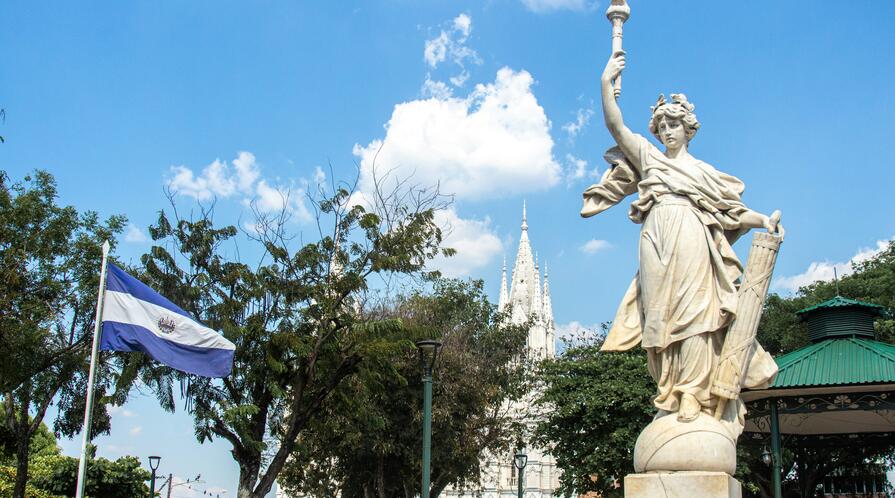The Fragility and Appeal of Authoritarianism in El Salvador
Overview & Contribution:
Salvadoran President Nayib Bukele calls himself the “world’s coolest dictator,” which may be an apt title given his social media savviness, backwards baseball caps, and concerted efforts to undermine democracy. While Bukele has enjoyed widespread popularity for his success in crushing El Salvador’s gangs, this has come at a high cost. Thousands of innocent Salvadorans have been imprisoned without due process as Salvadoran streets become ever more militarized. The “Bukele model” has been emulated by a number of Latin American leaders with authoritarian ambitions, which will likely complicate international efforts to isolate the Salvadoran government. Can Bukele continue to consolidate his personal power and popular support?
In “Does the Bukele Model Have a Future?” Beatriz Magaloni and Alberto Díaz-Cayeros argue that the Salvadoran state’s apparent strength sits atop an extremely fragile foundation: Bukele’s crime policy has successfully improved physical security for some while failing to deliver social and economic gains for El Salvador’s increasingly vulnerable citizenry. As the country’s economic situation worsens, Bukele’s support will decline, likely increasing his reliance on repression. The article is informed by original interview data, which illustrates how dire the situation for ordinary Salvadorans has become both inside and outside of the country’s notorious prisons.
The reader comes away somewhat optimistic that Bukele’s authoritarianism cannot remain popular indefinitely. And although El Salvador has largely evaded international pressure, this could change, for example, after the United States’ 2028 elections. At the same time, domestic efforts to push back against Bukele and his anti-democratic legacy will surely be difficult. The authors predict that Bukele will alternate between moments of popularity, episodes of repression, and external challenges.
The Bukele Model and Its Pitfalls:
Bukele is perhaps best known for his war on crime, which followed his unsuccessful attempts to negotiate with and make concessions to gang leaders. Although Bukele took office at a time when homicide rates had declined considerably, crime has sharply declined during his tenure. Yet El Salvador now enjoys the world’s highest incarceration rate by more than double the next highest country. Bukele has consolidated significant executive power, firing Supreme Court justices and pressuring his opponents via armed military and police incursions into the legislature.
The authors conducted interviews with formerly incarcerated Salvadoreans to better understand how the Bukele model has been experienced both inside and outside of prison. Interviewees report that ordinary people are incentivized to provide information (whether true or false) that leads to arrests because of the cash rewards offered. As the country’s economy worsens, these practices have led to a mushrooming of innocent arrests. Although international observers have tended to focus on human rights abuses in El Salvador’s CECOT prison, the conditions in more peripheral prisons are even more harrowing. As the authors report,
Upon entry, detainees are frequently subjected to a violent initiation ritual involving beatings by multiple prison guards…leav[ing] many prisoners with severe physical injuries…once confined…basic human needs such as rest, sanitation, breathable air, food, and water were denied. Some people…reported guards throwing tear gas into their cells and banging repeatedly on cell bars throughout the night…[they] described cells as so overcrowded that they were often forced to sleep in rotations: one half lying on the floors, with their neighbors’ feet pressed against their faces, while the remainder stood waiting for their turn.
A worrying consequence of Bukele’s rise is the diffusion and emulation of his “model” across the hemisphere. For example, Honduras and Ecuador have implemented states of emergency and deployed the military against domestic gangs, citing Bukele as inspiration. Javier Milei’s cabinet has used Bukele’s alleged success as a justification for undermining judicial autonomy in Argentina. Even Costa Rica — one of Latin America’s most stable democracies — built a CECOT-inspired prison and has witnessed growing support for strongman rule as it faces its highest homicide rates on record.
Possible Scenarios:
The authors identify three routes that might characterize El Salvador’s politics in the coming years, none of which are mutually exclusive. A first scenario would involve support for Bukele continuing or increasing. However, given El Salvador’s economic situation, this situation is very unlikely. In places like Singapore and Kuwait, autocrats have enjoyed steady popularity because they have been able to deliver economic prosperity. Yet Bukele lacks foreign investment and world-class infrastructure, as in Singapore, and it lacks the Gulf oil monies that have been showered on Kuwaiti citizens to buy their acquiescence.
A second scenario, which the authors see as more likely, is that Bukele’s popularity declines, leading him to default to more repression and authoritarianism. This parallels Venezuela under Nicholas Maduro, where the collapse of oil prices — which had previously boosted Hugo Chávez’s popularity — coincided with growing corruption and economic precarity. As the country experienced hyperinflation, Maduro clamped down on his opponents and the media while rigging elections.
A third scenario would involve international pressure from democratic countries, such as the US and Brazil. This could at least strengthen Salvadoran opposition forces, but would not likely restore the country’s democracy to pre-Bukele levels. For the time being, much of the international community has minimized or ignored Bukele’s transgressions. For example, Bukele maintains a strong relationship with Donald Trump, and a recent U.S. State Department report downplayed Bukele’s human rights violations. Magaloni and Díaz-Cayeros show how El Salvador exemplifies the tension between genuine public approval — driven by unprecedented reductions in gang violence — and mounting authoritarianism that inspires other Latin American leaders.
*Research-in-Brief prepared by Adam Fefer.

CDDRL Research-in-Brief [4-minute read]




